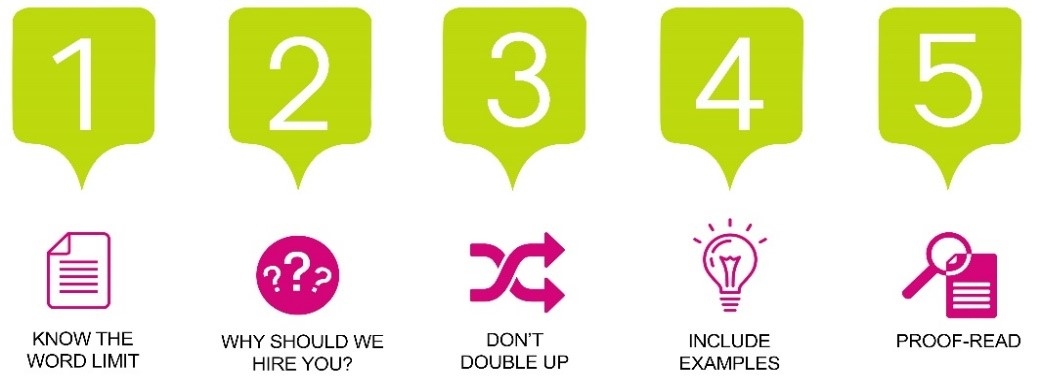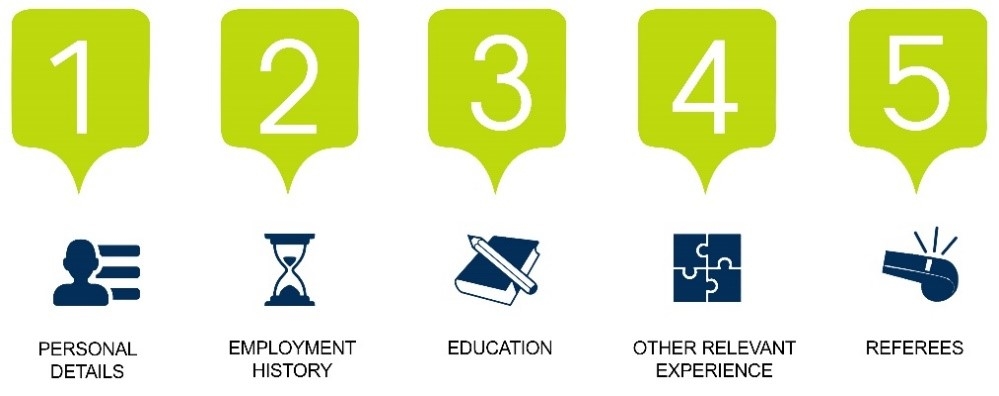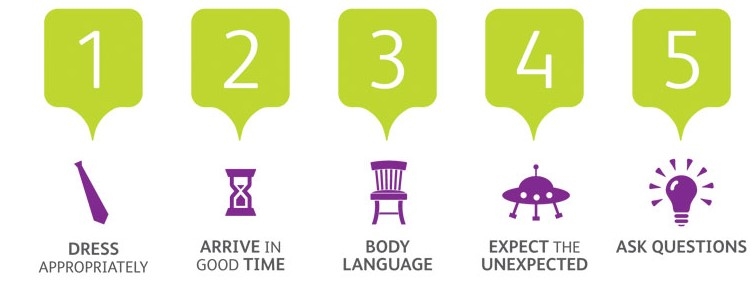ARC Recruitment: Information for Applicants
Your Response
We are always looking for different ways to find the right person for the right job. We may ask you to answer a couple of questions or to write a pitch. (Make sure you read all the documentation prior to preparing your response as requirements will change)
It is a vital part of your application and is your opportunity to demonstrate to the Committee how certain aspects of your skills, knowledge, experience and qualifications make you the best person for the job. You should use relevant, specific examples from your current and previous employment to support your claims.
Font size and word limit
For all ARC positions, the minimum font size is 10pt and the maximum word limit varies for different positions (please check selection documentation). Please ensure you select a font type/style and spacing that ensures your application is easily readable.

Tips for Your Response:
- All ARC positions have a maximum word limit (please check selection documentation) and a minimum 10pt font size. Your Response will not be eligible for assessment if you have exceeded the word limit.
- Your response is a chance to tell us why you are the right person for the job, in a nutshell—Why should we hire you?
- Try not to double up on information that is already in your resume, use the word limit wisely.
- Include and highlight specific examples and achievements that demonstrate your ability to succeed in the position.
- Always proofread your application yourself to catch any grammar/spelling errors. You should also enlist a second set of eyes to catch things that you may not have noticed as the writer. Requesting feedback from your additional proof-reader before submission is highly encouraged.
Resume
First impressions count when it comes to writing your resume. The content and quality is important and will be assessed by the Committee in addition to your Response and Job Application Cover Form as part of the shortlisting process.

Tips for preparing your resume:
- Your personal details should include your full name, email address and contact phone number. Although the ARC seeks this information via our Application Cover form, it is good practice to include general personal details in your resume.
- Include your relevant work history and the key responsibilities you were required to undertake. Your employment history should run in chronological order, starting with the most recent. Please make sure you specify start and end dates of employment and explain any gaps in time.
- Provide details of any qualifications/education you have relating to the job and the year they were obtained.
- Highlight any experience or key achievements you have had relating to the job.
- Include the referee’s name, contact details and their relationship to you e.g. current supervisor for at least two (2) professional referees who can validate and support your claims. Ideally, one referee should be your immediate supervisor. Please ensure you ask them what they have to say about you and seek their permission to use them as a referee.
Assessment and Selection Process
- The Australian Research Council (ARC) aims to find the right person for the right job and makes all assessment decisions based on merit in accordance with Section 10(2) of the Public Service Act 1999. This means that all assessment decisions are fair, ethical, non-discriminatory and made through a competitive selection process and not by individual affiliations.
- The assessment and selection methods used by the Selection Advisory Committee (Committee) must comply with APS recruitment legislation including the Public Service Regulations 1999 and Australian Public Service Commissioners Directions 2016.
- The most common selection method used by the ARC is assessment of; a written application, interview and referee report, however the Committee is not obliged to use all or any of these methods, and may also choose to use a range of other methods including; work sample testing, job scenarios or job knowledge testing to determine an applicant’s suitability.
- Applicants are assessed overall as either Suitable or Not Suitable, based on their ability to demonstrate and provide evidence that they can meet the job requirements within the Selection Documentation and how they rate compared to the other applicants.
Selection Advisory Committee
- The Selection Advisory Committee is generally made up of three (3) members and will usually include at least one (1) senior person from the work area such as a supervisor or manager.
Interview
If you have been successful in progressing to the interview stage, the HR Team (HR) will contact you to advise of your interview date and time. As an applicant, you will be regarded as being available for interview from the date the applications close. Should you be unavailable for any length of time, please email arc-hrteam@arc.gov.au to advise of your unavailability. HR and the Committee will make every attempt to cater to your availability, however there may be times where this is not possible.
Interviews are generally held by the Committee face to face. If an applicant is unavailable for a face to face interview, at the Committee’s discretion a phone interview may be an arranged.

Tips for Interview:
- Dress in a manner that is professionally appropriate to the position, it is much better to be “dressed up” than too casual. Dressing professionally shows respect for yourself and the Committee.
- Plan to arrive 10-15 minutes before the interview.
- Make a great entrance, from politely presenting yourself at reception to shaking hands with the Committee. Don’t forget smile.
- Know your strengths and weaknesses. Reviewing the Selection Documentation before interview will help you think of examples that best relate to the position.
- This is your opportunity to ask any thing you like about the position and the expectations of the role. Questions aimed at understanding the Team and Agency culture can help to determine if this is the right job for you.
Type of Interview Questions
The type of questions asked at interview may include:
General/Icebreaker: These type of questions gives the Committee a chance to get to know you better and are a great way to “break the ice” and ease into the interview e.g. “Tell us about yourself.”
Behavioural Based: These type of questions are asked by the Committee to determine how an applicant handles a specific situation and/or predict how the applicant may handle this situation in the future e.g. “Tell us a time when you were faced with a difficult situation and how did you handle it?”
Hypothetical Situations: These type of questions are asked by the Committee to see how an applicant will deal with an individual situation e.g. “This position requires someone with high level organisational skills and the ability to meet deadlines. Theoretically if you had several work tasks that were approaching their due date and you were unable to meet the deadlines, what would you do?”
How to Respond to Interview Questions
Applicants should listen to the interview questions carefully to make sure they understand the question and what is being asked. If required, applicants can ask the Committee to repeat the question.
A commonly used method to respond to interview questions is the STAR method, which stands for:
|
S |
Situation |
Start your response by providing the selection Committee with some background and overview of the situation. |
|
T |
Task |
Describe what happened or what needed to be done. |
|
A |
Action |
Specify what you did. |
|
R |
Results |
Explain what the result of your efforts were, what you learned and the outcome. |
Referee Reports
Referee reports are a crucial element in the selection process and are the final piece in the decision making. Referee reports are used to validate the findings of the Committee at interview. Generally, the ARC conducts verbal referee reports.
Applicants should include their nominated referees on their resume. Please email arc-hrteam@arc.gov.au if either of your nominated referees change or will be away for any period of time during the selection process.
